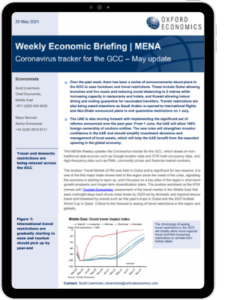MENA | Coronavirus tracker for the GCC – May update

Over the past week, there has been a series of announcements about plans in the GCC to ease lockdown and travel restrictions. These include Dubai allowing brunches and live music and reducing social distancing to 2 metres while increasing capacity in restaurants and hotels, and Kuwait allowing indoor dining and ending quarantine for vaccinated travellers. Travels restrictions are also being eased elsewhere as Saudi Arabia re-opened to international flights and Abu Dhabi announced plans to end quarantine restrictions on 1 July.
What you will learn:
- The UAE is also moving forward with implementing the significant set of reforms announced over the past year. From 1 June, the UAE will allow 100% foreign ownership of onshore entities.
- The new rules will strengthen investor confidence in the UAE and should simplify investment decisions and management of local assets, which will help the UAE benefit from the expected upswing in the global economy.
- This MENA Weekly updates the Coronavirus tracker for the GCC, which draws on non traditional data sources such as Google location data and STR hotel occupancy data, and high-frequency data such as PMIs, commodity prices and financial market numbers.
Tags:
Related Services

Post
US Rolls Up Welcome Mat for International Travel
Research Briefing MENA | Coronavirus tracker for the GCC – May update Trump tariffs set to raise effective rate above 1930s levels.
Find Out More
Post
Initial takeaways from Trump’s ‘Liberation Day’ announcement
In two or three years' time, US imports could fall by around 15% due to discounted reciprocal tariff hikes.
Find Out More